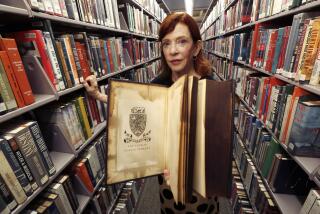Touched by the Turn of a Page
- Share via
The announcement last week that Google would begin digitizing the collections of several major research libraries evoked a memory from my graduate student days at the University of Pennsylvania. I was trying to find a journal in the library stacks when I happened on a 1929 book by Sterling Leonard on 18th century doctrines of English usage. The card in the pocket inside the back cover showed that it had last been checked out 12 years earlier by the great medievalist Albert C. Baugh, reason enough to give it a look.
Some years later, I sought out Leonard’s book in the Stanford University library, and found that that copy also held a yellowing card with Baugh’s delicate signature. It left me wondering whether every library in the world was holding a copy of Leonard’s book on its shelves just so someone could happen on it every dozen years or so.
That’s the vision of the ubiquitous universal library that scholars and technologists have been dreaming of since 1945, when Vannevar Bush conceived the Memex machine, a theoretical analog computer that could display all the books in the library at a scholar’s desk. With the development of the World Wide Web, that came to seem plausible. In 1995, IBM ran a commercial that showed an Italian farmer proudly explaining to his granddaughter that he had just gotten his degree remotely from Indiana University, which had put its entire library online with help from IBM. A lot of people took the conversion as a done deal, and the university librarian was obliged to explain that, to date, only a fraction of the library’s music collection had been digitized.
A great many scholarly and scientific journals have come online since then. But to most people, a library still means books: The Google announcement signals that the virtual library has become a reality, even if it will be a while in the making. It will take a decade to digitize 15 million books and documents from the Stanford and University of Michigan libraries, and more time than that before most other research collections are online. And although readers will have full access to books in the public domain, they won’t be able to view more than a few pages of books that are still under copyright.
In the scenario of that IBM ad, the digitization of library collections seemed destined to obviate the need for paper books and brick-and-mortar libraries. As Al Gore described the vision in 1984, “I want a schoolchild in Carthage, Tenn., to come to school and be able to plug into the Library of Congress.”
By now, though, people have begun to realize that what that Carthage schoolchild needs most is still a neighborhood public library, even if it’s a small one. When you’re 10 years old, it doesn’t take a huge collection to convince you that the world holds more books than you could ever read.
And the research library also has a continuing role to play. Scholars and scientists may be dazzled by the prospect of universal access to the world’s research collections, but the librarians who made the accord with Google don’t feel as if they’re presiding over the dissolution of their bookish empires.
This semester, I co-taught a graduate course at the Berkeley School of Information Systems and Management. The 15 or so people in the class were probably the most wired students at a very wired university in this wired corner of the world. But when I asked on the last day of class how many of them had visited the university library the previous week, two-thirds raised their hands, and all of them said they’d been there over the course of the semester.
That isn’t surprising. For one thing, physical libraries facilitate the sort of serendipitous encounter I had with Leonard’s monograph, even if barcodes and privacy concerns have sadly eliminated those cards with the names of previous borrowers. Most scholars will tell you that a lot of the most interesting books they’ve read are ones they happened on when they were looking for something else.
Searchable digitized texts are ideal for finding a reference or locating a particular passage. But it’s hard to get an overall sense of a book when you’re barreling into it sideways.
And for sustained reading, digital texts can’t provide the sense of place we have when we read a paper book, unconsciously measuring our progress by the diminishing distance between our thumb and forefinger. Reading Proust in a browser window is like touring Normandy through a bombsight.
That’s why it’s likely that book publishers will relax restrictions on viewing digital versions of copyrighted books. The evidence suggests that providing free access to large portions of books can often help their print sales.
There are only two reasons for buying a book, after all. Either we intend to read it, in which case most of us find a printed version preferable, or we don’t intend to read it, in which case a printed version is absolutely essential.
Still, there are risks to putting research collections online. The cost of digitizing large research collections is too great to permit a second pass, and the job has to be done to technical standards that will be adequate not just for today’s purposes, but for technologies 50 years in the future. (The French learned that lesson in 1993, when they inaugurated their new national library by digitizing a large collection of books at what turned out to be a poor image quality.) And no one is quite sure yet that we’ll be able to preserve digital records for anything like the lifetime of a paper book.
Then too, the advent of the virtual research library will no doubt increase the already strong pressures to cut back on library services, “de-acquisition” portions of expensive-to-maintain collections or even eliminate some libraries entirely -- “You’ve got all that stuff online now.”
That would be a pity. The virtual library may realize the fantasy of universal access that I had many years ago: Leonard’s seminal monograph will available to me not just from Penn and Stanford, but from Carthage, Tenn. But if the book isn’t on any library shelves, it’s not certain that anyone will stumble on it again.
More to Read
Sign up for our Book Club newsletter
Get the latest news, events and more from the Los Angeles Times Book Club, and help us get L.A. reading and talking.
You may occasionally receive promotional content from the Los Angeles Times.







